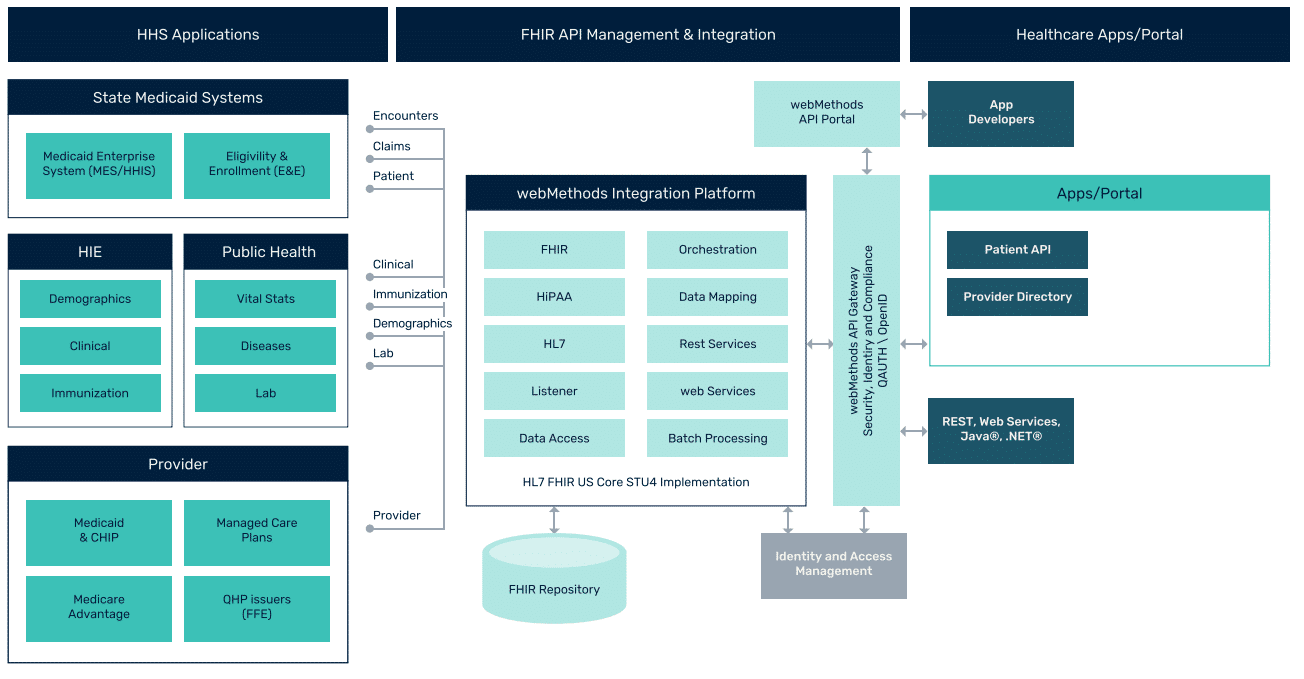The Software AG FHIR® Server for CMS Healthcare Interoperability
The CMS Interoperability and Patient Access rule presents the opportunity for State Medicaid agencies (SMAs) to enable the seamless and secure flow of patient data across the care continuum. To support this data exchange, the Centers for Medicaid and Care (CMS) Office of the National Coordinator for Health Information Technology (ONCHIT) has chosen Health Level 7 Fast Healthcare Interoperability Resources (HL7 FHIR®) Release 4.0.1 The rule requires all CMS-regulated payers to allow patients to access data via application programming interfaces (APIs) utilizing the FHIR data specification.
The Software AG FHIR Server, built upon the robust webMethods Integration and API management platform, supports the HL7 FHIR, release 4.0.1 specification. The solution provides SMAs a low-code platform with a wide range of features to easily transform data and quickly develop FHIR-based APIs for access to patient data including clinical, claims, and encounter information.
Solution Architecture

At the core of the Software AG FHIR® Server is the most robust, scalable and industry recognized webMethods API and Integration Platform, which provides the power to connect to any back-end systems faster using open, standards-based integration technology. The low code data mapping and orchestration capability provides the ability to transform data from any HHS application data sources such as mainframe and legacy data just as easily as the latest cloud applications to FHIR® standard resources. Over 300 pre-built connectors offer simplified data access to virtually any data source on any platform- non-relational, relational, cloud, big data or in memory. The Software AG FHIR® Server has built-in modules to process various message standards such as HIPAA 5010 and 5010A standard, HL7® Messaging Standards version 2.x, 3.0, EDI X12, EDIFACT, XML, Json and Flat files.
The Software AG FHIR® Server provides extensible FHIR Repository to store FHIR® resources. The repository can be implemented using any cloud databases such as Amazon DynamoDB, MySQL, Azure Cosmos DB , MongoDB etc.. which will help customers to use their own choice of database as FHIR® repository if needed.
The Software AG FHIR® Server comes with webMethods API Gateway which will take care of security, Identity, and compliance requirements of FHIR® APIs security. API Gateway supports OAUTH2.0, OpenID and Java Web Tokens(JWT) which can be used for securing FHIR® APIs using any Identity and Access Management provider(IDP) such as AWS Cognito, Azure AD and OKTA etc..
Software AG FHIR Server Key Features
- Ready to use FHIR Server reference implementation based on HL7 US Core Implementation Guide 4.0 STU4 release
- Can be used as FHIR Façade to existing systems using low-code platform
- RESTful APIs
- Role Based Access Control (RBAC) Support
- API Security using OAUTH 2.0/OpenID
- FHIR Repository persistence layer can be extended to use any RDBMS such as Oracle, SQL Server etc. or any cloud databases such as AWS Dynamo DB or Azure Cosmos DB
- Solution is customizable to deploy to any cloud platform such as Amazon AWS or Microsoft Azure.
- API Security can be Integrated with any Identify and Access Management software such as AWS Cognito, Azure AD, OKTA or Ping federate
Jumpstart your FHIR
The webMethods Integration Platform is proven in SMAs across the country processing millions of Medicaid data transactions every year from application and enrollment to claims processing, webMethods is easily scalable and ready to access data in a variety of systems. The Software AG FHIR Server provides SMAs the ability to jumpstart the implementation of FHIR and establish a foundation to easily meet current and future interoperability requirements.
“HL7®, FHIR® and the [ FHIR FLAME DESIGN] are the registered trademarks of Health Level Seven International and their use does not constitute endorsement by HL7.”



